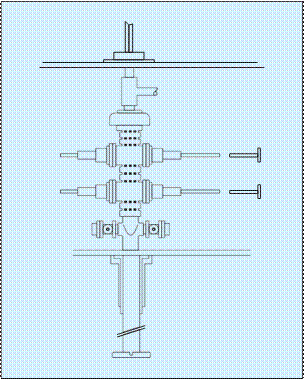Keith is from the Petrolleum Programme, a BBC radio series about the language of the oil industry.
Keith: How do you do, Barry. My name's Keith. I'm from the Petroleum Programme.
Barry: How do you do. Can I help you?
Keith: Would you mind explaining what the driller and the floorman are doing? I notice they're not drilling today. The rotary table isn't turning. And where has the kelly gone?
Barry: Well, first of all, the kelly's over there. In that hole over there, in the corner of the derrick floor. See?
Keith: Oh yes, I see it. And is that the rathole it's standing in?
Peter: That's what we call it. How did you know that?
Barry: Yes, you're certainly right. When we're not using the kelly, we set it in the rathole, in the derrick floor.
Keith: Why is the kelly in the rathole now?
Barry: Because we've pulled out. We've hoisted the pipe out of the hole. We've stacked the pipe and we can't do any drilling because there's a fish in the hole.
Peter: We've going to fish for it now. We're getting the fishing tools ready.
Keith: But what is a «fish»? What does that word mean? Would you mind explaining it please?
Peter: Barry?
Barry: Sure. A fish is something we've lost in the hole. Sometimes it's a tool or another piece of equipment. Sometimes it's a part of the drilling string.
Peter: Today it's one of the cutters. We've lost one of the cutters from the bit. It's in the hole.
Barry: So, we're going to fish for it.
Keith: When do you think you'll catch it?
Peter: Oilmen don't say «catch» a fish, Keith.
Barry: We say «latch on to» a fish. We're going to try to latch on to the cutter now. We're going to use special fishing tools.
Peter: And I sure hope we latch on to that fish soon. Barry: So do I. Then we can run the drilling string in again… Peter: … and hoist the kelly out of the rathole…
Barry: … and start making hole again.
Keith: Good luck, then. I hope you latch on to that fish soon.
Peter: Thanks a lot, Keith.
Answer the following questions.
1. From your listening practice in Unit 1, you know that Peter is the mud engineer. What job do you think Barry does? Why do you think so?
2. Why is the kelly in the rathole now?
3. In the oil business, what is a fihs?
4. What are the crew going to do about the junk in the hole?
5. Keith politely asks Barry to explain what the driller and the floormen are doing. What expressions does he use?
Listen to the conversation between Michael and Barry. While you are listening, look at the diagram below.
 Michael: Hello, Barry.
Michael: Hello, Barry.
Barry: Welcome to the rig, Michael.
Michael: Well then, Barry, where's the BOP stack?
BOP Stack
Figure 1.7
Barry: Not here on the rig floor. It's underneath us. Follow me and I'll show you.
(they climb down some steel steps)
Barry: Here it is, right in the
middle, under the rig floor. The rotary table is just above it and us.
Michael: So this is the BOP stack. It's quite a big piece of machinery.
Barry: It has to be big and strong. If there's a kick or a blowout, the BOP stack will shut in the well and control it.
Michael: And what's this? What's this that the stack is standing on?
Barry: That's the well-head, Michael. That's where the casings are connected here at the top of the hole.
Michael: I see. And what's the working pressure of the stack?
Barry: That depends, of course, on the depth of the well and the pressure that we expect. The working pressure of this BOP system is ten thousand pounds per square inch.
Michael: Ten thousand p. s. t. You must be planning to drill down a very long way.
Barry: We are. Or at least, that's our programme.
Michael: Do you mean that you may be lucky, and hit an oil zone soon?
Barry: In this business, Michael, you never know. It's full of surprises.
Answer the questions.
1. BBC stands for British Broadcasting Corporation. BOP stands for blowout preventer. What does p. s. t. stand for?
2. Is Barry's rig onshore or offshore? How do you know?
3. A «kick» is a sudden push upwards, against the drilling fluid. If there's a kick, what will the BOP stack do?
4. What's the working pressure of the BOP system on Barry's rig?
5. The working pressure of BOP stacks are not all the same. What does the working pressure of a BOP stack depend on?
 Grammar
Grammar



 Michael: Hello, Barry.
Michael: Hello, Barry. Grammar
Grammar

